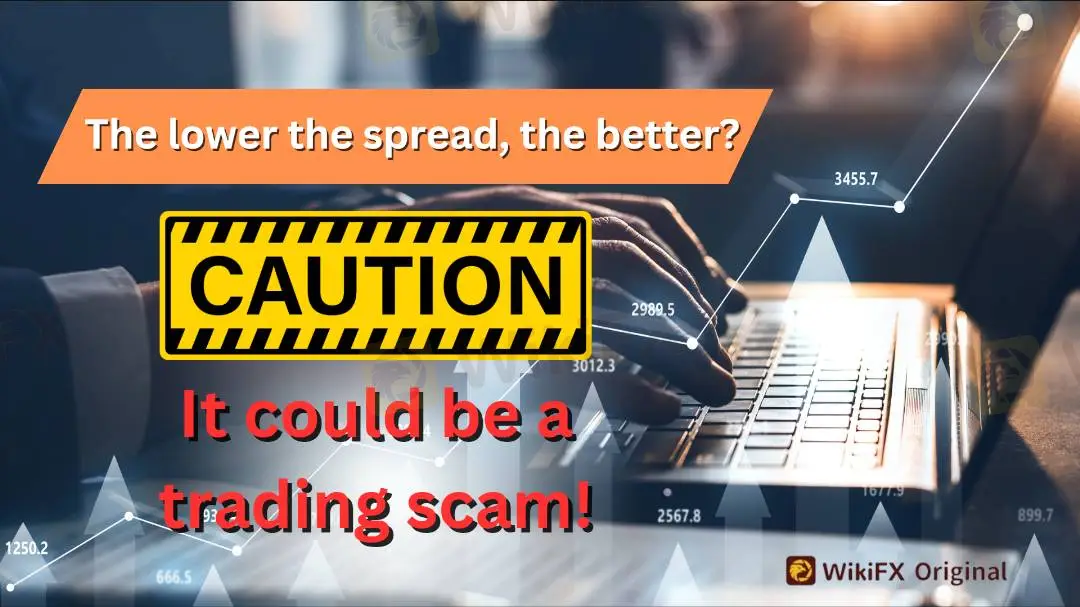简体中文
繁體中文
English
Pусский
日本語
ภาษาไทย
Tiếng Việt
Bahasa Indonesia
Español
हिन्दी
Filippiiniläinen
Français
Deutsch
Português
Türkçe
한국어
العربية
The lower the spread, the better? Be cautious, it could be a trading scam!
Abstract:As part of investment trading, spreads not only serve as a source of income for brokers but also affect the profitability of investors. For investors, it is generally preferred to have lower spreads. However, reality can be cruel, as platforms promising ultra-low spreads or even zero spreads may be gimmicks used by some unscrupulous trading platforms. Today, WikiFX will discuss the hidden secrets behind such practices.
As part of investment trading, spreads not only serve as a source of income for brokers but also affect the profitability of investors. For investors, it is generally preferred to have lower spreads. However, reality can be cruel, as platforms promising ultra-low spreads or even zero spreads may be gimmicks used by some unscrupulous trading platforms. Today, WikiFX will discuss the hidden secrets behind such practices.

Platforms with low spreads are more likely to attract investors' favor.
For those who are less familiar with investment, they may not be aware of the concept of spreads. Simply put, spreads refer to the difference between the market price and the actual transaction price.
To illustrate, let's consider a scenario where a bank sells an investment product for 1 million dollar and the broker charges a spread of 10,000 dollar. In this case, the actual transaction price becomes 990,000 dollars. On the other hand, when an investor buys the product, the broker adds 10,000 dollars to the base price of 1 million yuan, resulting in an actual transaction price of 1.01 million dollars. This difference in price between the seller and the buyer is what we call spreads.
Therefore, most investors tend to favor platforms with low spreads in order to save costs and maximize their profits.
Promoting low spreads conceals the tactics of fraudulent platforms.
In the investment market, we often come across promises of low spreads, but the reality is often far from what people expect. Take forex trading as an example, low spreads do not necessarily equate to low costs and high returns. Instead, what you may encounter are black platforms where the result is potential loss and the inability to withdraw funds.
Generally, these fraudulent platforms exploit investors' tendency to seek cheap deals. They attract attention by advertising low spreads, sometimes even claiming zero spreads. However, these promises are nothing more than bait to lure investors. Once investors deposit their funds, they fall into a trap.
The tactics employed by these fraudulent platforms are not particularly sophisticated, and experienced investors can easily see through them. Some investors fall into the trap not because they lack intelligence, but because they are lured by these temptations and are willing to take risks.
Self-discipline is the best defense against fraudulent platforms.

The primary reason many investors fall into the traps of fraudulent platforms and suffer significant losses in their investment journey is due to their excessive greed. This mindset directly leads to improper trading practices and a disregard for the dangers posed by fraudulent platforms.
Unfortunately, fraudulent platforms are prevalent in the investment market. As investors, we cannot change the industry environment. The only thing we can do is ensure that we are not deceived by these “small gains” and protect ourselves from fraudulent platform schemes. Ultimately, preventing fraud requires investors to exercise self-discipline and caution.
Investment carries risks, and careful consideration is crucial in making choices. The primary goal of investors is to achieve profitability. To avoid significant losses and falling into the traps of fraudulent platforms, it is advised to select reputable brokers. It is important not to trust false claims made by fraudulent platforms, such as extremely low spreads, and to refrain from taking risky actions when it is known that the platform operates in an irregular manner.
If you wish to assess the qualifications of a trading platform, such as whether it is an official channel, the regulatory licenses it holds, the credentials of the company itself, and its reputation, you can conduct a search on WikiFX.

Disclaimer:
The views in this article only represent the author's personal views, and do not constitute investment advice on this platform. This platform does not guarantee the accuracy, completeness and timeliness of the information in the article, and will not be liable for any loss caused by the use of or reliance on the information in the article.
Read more

Smart Prop Trader to Close Doors in December 2024
Smart Prop Trader, a proprietary trading firm known for offering funded trading accounts, has announced plans to cease onboarding new traders as it prepares to wind down operations by the end of the year.

NAGA Adds UAE, Saudi Stocks to Platform with Zero Commissions
NAGA introduces UAE and Saudi Arabian stocks to its trading platform, offering zero commissions and expert tools like Autocopy to tap into booming Middle Eastern markets.

Unleash Your Trading Skills: Join the WikiFX KOL India Trading Competition!
Are you ready to take your trading expertise to the next level? WikiFX is excited to announce an extraordinary India Trading Competition designed to connect passionate forex traders, enhance user engagement, and reward trading excellence!

Moomoo Financial & M1 Finance Face FINRA Sanctions for Influencer Misconduct
FINRA has fined Moomoo Financial and M1 Finance for failing to ensure compliance with regulatory standards in their social media influencer programmes, highlighting the growing need for robust oversight in digital marketing within the financial services industry.
WikiFX Broker
Latest News
Robinhood Launches Ethereum Staking with 100% Rewards Match
Kraken Closes NFT Marketplace Amid New Product Focus
Philippine Banks Launch PHPX Stablecoin to Transform Payments
Broker Review: Is FOREX.com a solid Broker?
Tether to Discontinue EURt Stablecoin Amid Regulatory Shifts in Europe
Adani’s Bribery Scandal! SEC Charges, Major Fallout & Adani’s Stand
Unleash Your Trading Skills: Join the WikiFX KOL India Trading Competition!
NAGA Adds UAE, Saudi Stocks to Platform with Zero Commissions
Philippine Scam Ring Targets Aussie Men with Fake Crypto Offers
ED uncovered 106 Crore "Nagaland Crypto Scam"
Currency Calculator


